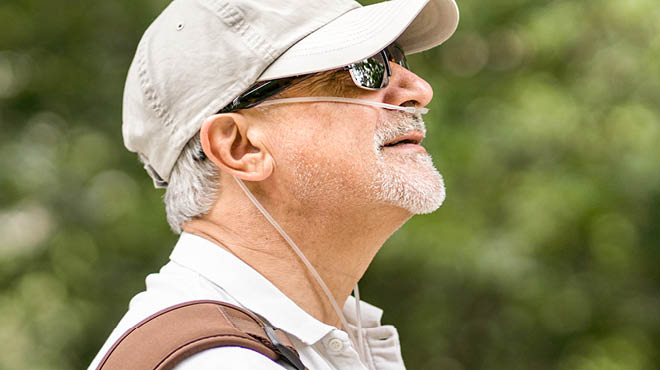Checking the facts of COPD

On average, people take 20,000 breaths every day. Your lungs are one of the largest organs of the body, and they do a lot of work 24/7 to keep you alive.
If you have chronic obstructive pulmonary disease, or COPD, it can change your life. The disease causes obstructed airflow of the lungs and produces symptoms such as coughing, wheezing and shortness of breath.
Let's examine a few facts and fallacies regarding COPD so that you can keep your lungs healthy:
COPD is caused by smoking.
True. Smoking tobacco with cigarettes, cigars or pipes is, by far, the No. 1 cause of COPD in the U.S. Over time, smoking does irreversible damage to the inside of the lungs. Other causes of COPD include prolonged exposure to second-hand smoke, air pollution, and occupational dust, smoke or chemical fumes. Rare cases of COPD result from a genetic disorder.
COPD is easy to catch early.
False. COPD develops slowly over many years, so most people are at least 40 when symptoms begin. Some people lose nearly 50% of their lung function before noticing any breathing problems. At that time, much of the damage to the lungs has already been done. Your healthcare professional may recommend a chest X-ray, CT scan or a pulmonary function test to properly diagnose you with COPD.
Chronic bronchitis and emphysema are other types of COPD.
True. Chronic bronchitis is an inflammation and narrowing of the airways that carry air to the lungs. It typically causes symptoms like a chronic, phlegmy cough and wheezing, and can be an early sing of lunch damage. Emphysema is a lung disease in which the fragile alveoli (air sacs) in the lungs become damaged which can go unnoticed for many years. You may develop a need for long-term oxygen therapy if the conditions are not detected early.
COPD can be cured.
False. Once the damage to the lungs has been done, it cannot be reversed. However, COPD can be treated and managed to reduce its effect on your quality of life. The first and most important thing to do is eliminate the cause. For most people, that means stopping smoking. Treatments for COPD include medications, such as inhalers, steroids and antibiotics. COPD patients may also benefit from lung cancer screenings, oxygen therapy, lung rehabilitation, lung volume reduction or a lung transplant.
COPD leads to other health concerns.
True. While COPD may not be the cause of death, it can cause other more deadly diseases and conditions like lung cancer. COPD makes you are more susceptible to respiratory infections, such as colds, influenza and pneumonia. It also increases your risk of heart disease, high blood pressure and depression.
If you've smoked most of your life, stopping now won't make a difference.
False. As it turns out, you can add years to your life expectancy and slow the decline in your health as soon as you stop smoking. It's never too late to quit. You also can lower your risk of developing lung cancer by stopping smoking and enrolling in a lung screening program. Regular screenings can help detect cancer earlier with a low-dose CT scan of your lungs.
If you have a cough or wheeze, and are a smoker, then you have COPD.
False. COPD is commonly misdiagnosed, so it's vital to not assume this diagnosis. Former smokers often are told that they have COPD when they have deconditioning of the lungs. COPD should be diagnosed by a healthcare professional. Many people with COPD aren't diagnosed until the disease is advanced and treatment is less effective, so getting a diagnosis as early as possible is important.
If you have concerns about respiratory symptoms, contact your healthcare team.
In this video, I speak about COPD symptoms, treatment and prevention:
Sunny Khosa, M.D., is a pulmonologist in Mankato, Minnesota.



